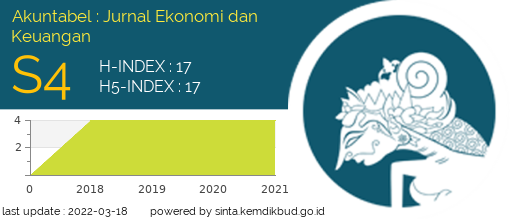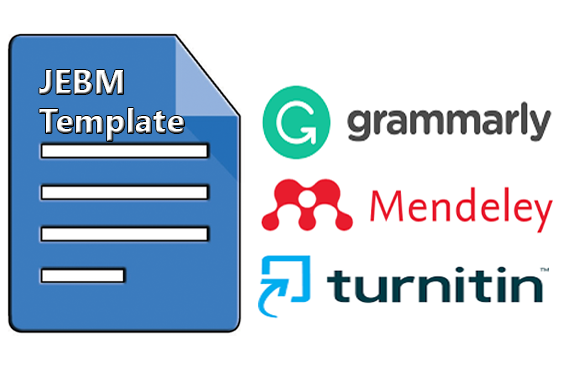Dampak proses politik terhadap pembentukan standar akuntansi studi literatur fokus kepada fasb
Abstract
Tujuan dari penelitian ini untuk memberikan ikhtisar literatur empiris pada politik pengaturan standar akuntansi, dengan fokus pada Dewan Standar Akuntansi Keuangan AS (FASB). Meskipun sebenarnya jelas dari pengamatan bahwa politik memang memainkan peran dalam penentuan standar akuntansi, kami berpendapat bahwa lebih banyak yang bisa dilakukan untuk meningkatkan pemahaman kita tentang topik penting ini. Berdasarkan tinjauan kami, kami menguraikan apa yang kami lihat sebagai sejumlah arah yang berpotensi menghasilkan untuk penelitian di masa depan.
Keywords
Full Text:
PDF (Bahasa Indonesia)References
Allen, A., K. Ramanna, and S. Rowchowdhury. 2012. The Auditing Oligopoly and Lobbying on Accounting Standards. Working Paper, Harvard Business School.
Available at http://papers.ssrn.com/sol3/papers.cfm?abstract_id=2187947.
Allen, A., and K. Ramanna. 2013. Towards an Understanding of The Role of Standard Setters in Standard Setting. Journal of Accounting and Economics 55: 66-90.
Arifin, Bustanul dan Didik J. Rachbini, 2001.. Ekonomi Politik dan Kebijakan
Publik. Jakarta: PT Grasindo.
Beresford, D. R. 1993. How to succeed as a standard setter by trying really hard.
Accounting Horizons 11: 79-90.
Bertomeu, J. and R. P. Magee. 2011. From low-quality reporting to financial crises: Politics of disclosure regulation along the economic cycle. Journal of Accounting and Economics 52: 209-227.
Baldwin dan Cave. 1999. Understanding Regulation : Theory, Strategy, and Practice. Second Edition. Oxford : Oxford University Press
Caporaso J.A., Levine D.P. 1992. Marxian Political Economy : Theories of Political Economy. Cambridge University Press : Cambridge Books Online :
Deakin, E. B. 1989. Rational Economic behavior and lobbying on accounting issues: Evidence from the oil and gas industry. The Accounting Review 64: 137-151.
Dechow, P. M., A. P. Hutton, and R. G. Sloan. 1996. Economic consequences of accounting for stock-based compensation. Journal of Accounting Research 34: 1-20.
Deliarnov. 2006. Mencakup berbagai teori dan konsep yang komperehensif : Ekonomi Politik. Jakarta: PT. Gelora Aksara Pratama
Francis, J. R. 1987. Lobbying Against Proposed Accounting Standards: The Case of Employers; Pension Accounting. Journal of Accounting and Public Policy 6: 35-57.
Gerboth, Dale, L., (1973),”Research, Intuition, and Politic In Accounting Inquiry,” Accounting Review, July, h. 481.
Gipper, B., B. Lombardi, and D.J. Skinner. 2013. The Politics of Accounting Standard-Setting: A Review of Empirical Research. Journal of Accounting Research p. 1-53.
Howieson, B. A. 2009. Agenda formation and accounting standard-setting: lessons from the standard setters. Accounting and Finance 49: 577-598.
Horngren, Charles, T. 1973. ”The Marketing of Accounting Standards,” JOFA, Oktober, h. 61.
Johnston, D. and D. Jones. 2006. How Does Accounting Fit into a Firm’s Political Strategy? Journal of Accounting and Public Policy. 25: 195-228
Kelly, L. 1982. Corporate Lobbying and Changes in Financing or Operating Activities in Reaction to FAS No. 8. Journal of Accounting and Public Policy 1: 153-173.
Kelly, L. 1985. Corporate Management Lobbying on FAS No. 8: Some Further Evidence. Journal of Accounting Research 23: 619-632.
Leftwich, R. 1995. The agenda of the Financial Accounting Standards Board. Working paper, University of Chicago, November.
Mardiyah, A.A. 2002. Dampak Proses Politik dan Konsekuensi Ekonomi dalam Pembentukan Suatu Standar. Jurnal Akuntansi dan Investasi Vol. 3 No. 2, hal: 96-123.
May, Robert, G., dan Sundem, Gary, L. 1976. ”Research for Accounting Policy: An Overview,” Accounting Review, Oktober, h.750.
Puro, M. 1984. Audit Firm Lobbying Before the Financial Accounting Standards Board: An Empirical Study. Journal of Accounting Research 22: 624-646.
Ramanna, K. 2008. The Implications of Unverifiable Fair Value Accounting: Evidence from the Political Economy of Goodwill Accounting. Journal of Accounting and Economics 45: 253-281.
Solomons, D. (1978). The Politicization of Accounting, ”The Journal of Accountancy”, November, h. 65-72.
Watts, R. L. 1977. Corporate Financial Statements: A Product of the Market and Political Processes. Australian Journal of Management 2: 53-75.
Watts, R. L., and J. L. Zimmerman. 1978. Towards a Positive Theory of the Determination of Accounting Standards. The Accounting Review 53: 112-134.
Watts, R. L., and J. L. Zimmerman. 1986. Positive Accounting Theory. Englewood Cliffs, NJ: Prentice Hall.
Yustika, Ahmad Erani. 2013. Ekonomi Kelembagaan : Paradigma, Teori dan Kebijakan. Edisi Kedua. Jakarta: Erlangga.
Zeff, S. A. 1972. Forging Accounting Principles in Five Countries: A History and Analysis of Trends. Stipes Publishing Company, Champaign, IL.
DOI: https://doi.org/10.30872/jakt.v15i2.4645
Refbacks
- There are currently no refbacks.
Copyright (c) 2019 Alan Smith Purba, Elza Rahmania Dwi Utami
Editorial Address
Akuntabel: Jurnal Akuntansi dan Keuangan
Faculty of Economics and Business, Mulawarman University
Jl. Tanah Grogot No.1 Samarinda Kalimantan Timur 75119
Email: jakt.feb.unmul@gmail.com
StatCounter: Akuntabel: Jurnal Akuntansi dan Keuangan






